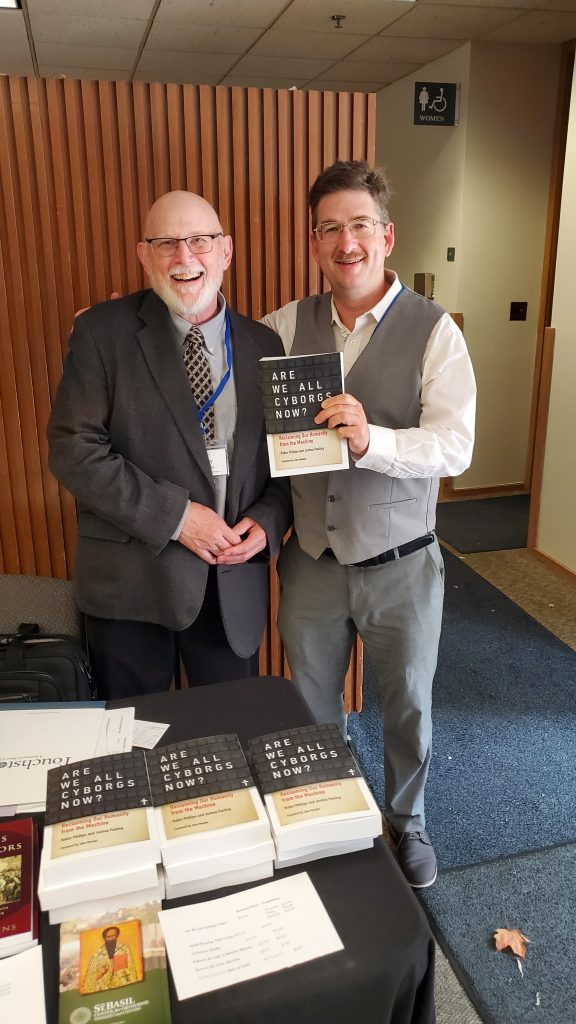 Here I am with our publisher, Dr. Gary (Cyril) Jenkins, at the Touchstone conference. I’m so thankful Dr. Jenkins caught the vision for this book, because our message is much needed! Most people who write in the rage-against-the-machine genre end up (ironically!!) succumbing to the worst elements of machine culture through eschewing digital literacy.
Here I am with our publisher, Dr. Gary (Cyril) Jenkins, at the Touchstone conference. I’m so thankful Dr. Jenkins caught the vision for this book, because our message is much needed! Most people who write in the rage-against-the-machine genre end up (ironically!!) succumbing to the worst elements of machine culture through eschewing digital literacy.
Digital literacy, like driving literacy, includes behavior, and thus good habits, appropriate boundaries, and virtues. But digital literacy has been caught in the pincer movements between techno-utopians and techno-rejectionists. It’s not hard to understand why. Techno-utopians tend to eschew discussion of boundaries and virtues since this often entails some form of digital minimalism. But equally, techno-rejectionists are often the last people interested in using boundaries to leverage digital technology for good. Indeed, the techno-rejectionist tends to be as uninterested in talking about boundaries as a vegetarian is interested in participating in a seminar on responsible meat purchasing and preservation.
Our book is part of the very small corpus of literature that argues for the need to advocate digital literacy within the larger framework of tech-skepticism. That may seem like a contradiction, but we compare it to driving. Even if we believe that the automobile has had an overall negative impact on society and human community, we can all agree about is that, given the type of world in which we live, our sons and daughters need to learn the driving skills and virtues. A responsible parent would not simply hand over the car keys to a twelve-year-old, or even a fifteen-year-old, and expect everything to be fine. Similarly with digital interfaces: whether we think these devices should never have been invented, we should all be able to agree that, given the type of world in which we live, our kids need to learn digital skills and virtues. A responsible parent will not hand a kid an iPhone any more than car keys and expect everything to be fine; rather, the parent will teach skills, character traits, and virtues constitutive of flourishing in the digital age. Digital skill are not the same as IT skills, but include things like:
- aptitude at performing effective due diligence on an information claim;
- ability to reply to a text message with follow-up questions and knowing how to effectively construct those questions;
- skill at setting up an effective query in a web search and knowing how to fact-check the resulting answers;
- competence at recognizing if a podcaster is speaking from a place of expertise or just making things up;
- skill in scrolling through an information stream to extract needed information without being drawn into extraneous or spiritually damaging stimuli;
- aptitude at using social media for connecting with friends rather than using it for addictive or pre-addictive behaviors like thrill-seeking and dopamine spikes.
- ability to use metacognition (awareness of one’s own brain activity) to monitor if your brain is working efficiently or being colonized by digital forces outside your control. (An example of metacognition is recognizing something like, “I notice my brain is tired right now, so I might want to stay off platforms like YouTube that are hard to manage responsibly when tired,” or “I can notice myself slipping into search habits to simply confirm my biases, rather than genuinely seeking out a range of perspectives.
Further Reading


